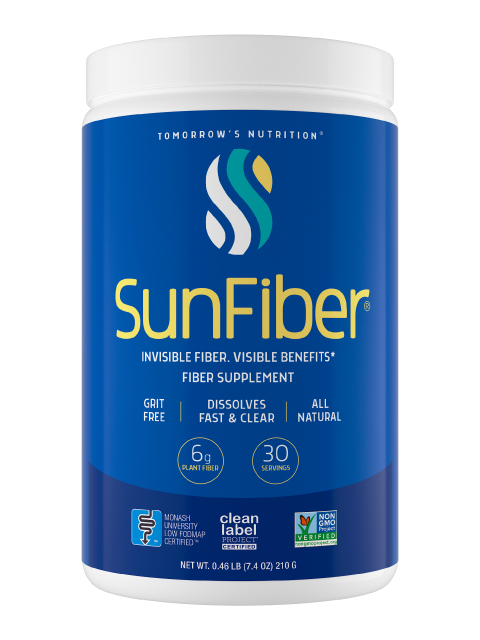Dietary fiber is essential for good health. But the relationship between fiber and Irritable Bowel Syndrome (IBS) can be a little complicated. That’s because some fibers may ease IBS symptoms while others may worsen them. And because everyone’s microbiome is unique, understanding precisely how your body will respond to specific foods and types of fiber usually requires some trial and error.
The good news is that we now know some soluble fibers such as Monash University Low-FODMAP Certified Sunfiber can comfortably and consistently help people with IBS meet their daily fiber requirements.
What is IBS?
According to the International Foundation for Gastrointestinal Disorders, which has designated April as IBS Awareness Month, IBS is an intestinal disorder characterized by a group of symptoms including constipation, diarrhea, bloating, gas and cramping. There are no tests for IBS so diagnosing the condition is usually done through a process of elimination.
Fiber, FODMAPS and fermentation
Research shows that reducing FODMAPs (an acronym for Fermentable Oligosaccharides, Disaccharides, Monosaccharides and Polyols) may help manage IBS symptoms. FODMAPs are foods that contain carbohydrates and sugars that are either difficult to digest (malabsorbed) or rapidly fermented. This results in bacterial fermentation in the large intestine, causing excess gas and bloating.
Going through a FODMAP screening program, or elimination phase, under the guidance of a healthcare professional, can help determine which FODMAPs may be triggering IBS symptoms. For some, it may be garlic and onions. For others, it may be wheat, beans, mushrooms or cabbage.
One pitfall of reducing FODMAPs in the diet is that you might also be reducing dietary fiber intake. Unfortunately, most traditional fiber supplements are high FODMAP, which can worsen digestive symptoms.
Sunfiber was the first fiber certified Low FODMAP by Monash University. This means individuals can confidently consume Sunfiber to meet their fiber needs without experiencing undesirable side effects of high FODMAP fibers. Eight studies specifically show Sunfiber’s benefits related to IBS symptoms such as regularity, abdominal pain, gas and bloating.
Sunfiber has been shown to help those with IBS-C (constipation) to have more frequent and comfortable bowel movements. And it’s helped those with IBS-D (diarrhea) to have more regular bowel movements with better formed stool. Sunfiber also has been shown to benefit children with chronic abdominal pain or IBS.
Sunfiber is approved to use the Health Canada-approved health claims for IBS. Specifically, a five-gram serving of Sunfiber may help to:
- Improve bowel regularity in people with IBS.
- Relieve constipation and gastrointestinal discomfort in people with IBS.
- Reduce the frequency of bowel irregularity and abdominal discomfort in people with IBS, including flatulence, bloating, dyspepsia and altered bowel habits.
- Relieve bowel irregularity, bloating and other gastrointestinal symptoms in people in IBS.
One more smart strategy for managing IBS symptoms: Keep a food and symptom diary. If your gut is rumbling, FODMAPs may not be the only culprits. Stress, lack of sleep and hormonal changes can also do a number on your digestive system. So can skipping your daily workouts.



0 Comments